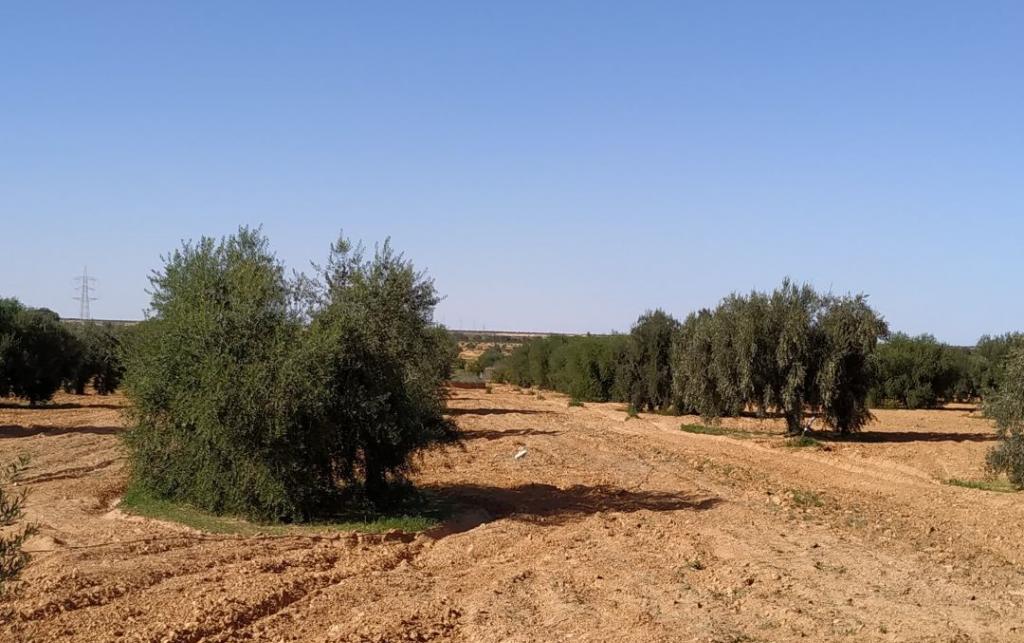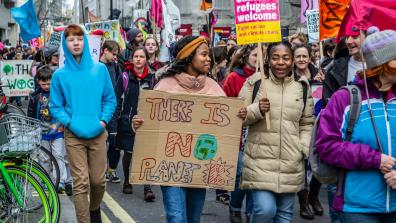'Food security' vs 'Food Sovereignty' – North Africa

Author: Dr Sara Razai
This article is the English version from the Réseau ritimo special dossier on Food Sovereignty in North Africa. You can read the full dossier (in French) here: https://www.ritimo.org/L-universel-au-detriment-du-particulier-la-tension-entre-securite-alimentaire
With the support of international financial institutions, ‘food security’ has become the most used concept in agricultural policies implemented by governments. The concept is broadly defined as the adequate and secure provision of food globally. Rooted in neo-liberal thought, food security is an operational principle that seeks to mitigate some of the issues relating to global development: it is justified on the basis of a perceived solidarity between people, a direct solution to the global shortage of food.
While the aim of food security is laudable in its end-goal (i.e. the end of the world’s chronic food shortage), the means, conditions and production of enough food appear in practice to be of little importance. By means of illustration, the present Covid-19 pandemic has impacted the global food system and disrupted regional agricultural value chains. At the onset of the outbreak, there has been a significant increase in demand. Border closures, quarantines, and market, supply chain and trade disruptions have restricted people’s access to food, and countries, especially those already affected by food shortages, have seen their situation worsening.
However, according to the UN Food and Agriculture Organisation, there is no need for the world to panic because “globally, there is enough food for everyone”. This is the attitude embedded in the concept of food security that is problematic. Like many aims promoted at the global level, the particulars of the universal tends to be overlooked. The concept of food security is not simply a description and explanation of ideas, it has become a tool to promote certain policies and create a semblance of universal consensus. What food security fails to consider is the mechanisms put in place to ensure food security have in fact impoverished and starved people, and deprived communities of food they produced with their own hands.
For countries in the Global South, the question of food production and its availability represents an urgent and strategic issue. The commodification of food has thrown several states into a vicious cycle of dependence, which prevents them from consuming the basic food that they have produced. In light of the many issues with food security, the concept of food sovereignty has emerged.
Food sovereignty seeks to emphasise the need to support local production and to ensure farmers’ rights to define their own agricultural and food policies. In contrast with food security, the concept of food sovereignty offers an alternative operational principle that consciously rejects agricultural policies underpinned by neoliberalism and neo-colonialism.
The inherent issues with food security feature prominently in two in-depth studies on the state of the agricultural sector in Tunisia and Morocco. The two studies were carried out in 2019 by the Working Group on Food Sovereignty in Tunisia (GTSA) and ATTAC Morocco. They attempt to shed light on how food security and food sovereignty have been translated into practice. Both provide for a rare insight into the daily lives of small and medium scale Tunisian and Moroccan farmers. Through various testimonies, the reports convincingly show how access to food and its production are inherently political questions, underpinned by themes that strike at the core of the tension between food security and food sovereignty. (Download the summary of our partners report.)
Land Grabbing: a colonial practice continued post-independence
At present, many countries in the Global South are faced with the issue of land grabbing. The practice, often rooted in the country’s colonial past, has been continued by post-independence governments. Although there are various forms of land grabbing in Tunisia and Morocco, one clear pattern emerges: small and medium size farmers are being dispossessed of their lands through a transferral of rights to foreign and local agricultural investors and enterprises. This intense commodification and privatisation of land – often land that was collectively owned – has had staggering effects on farmers and agricultural workers. Among the hardest hit victims are women who, in addition to being dispossessed of collective lands, have been side-lined from decisions that affect their lives.
Following its independence in 1956, Tunisia began a comprehensive programme of reclaiming and purchasing agricultural land held by French colonial settlers. In the 1960s, state owned agricultural land was part of the cooperative movement, which focused on diversifying and improving production. Despite their successes, these cooperatives were soon overshadowed by Tunisia’s adoption of a liberal economic and political program, and effectively put to an end.
In a similar vein, the acquisition of collective lands in Morocco dates back to French colonisation and the administration’s efforts at disintegrating traditional social structures and the ownership of collective lands. Equipped by an arsenal of laws, or dahirs, collective lands were reorganised, which allowed the colonial administration to interfere in their management. This effectively dismantled traditional systems of collective decision-making among members of the community. Collective lands are being seized, sold and leased to public and private companies with the approval of community representatives. (Read our report on parallel land grabs of collective land in Papa New Guinea: The SABL Land Grab)
Monocropping destined for export
In Morocco, the state export approach has destroyed many local agricultural cultivars through its focus on exportable crops, with commercial agriculture relying on hybrid seeds used mainly in the production of grains, corn and vegetables.
The cultivation of foreign cultivars of seeds and trees is based on soil exhausting and water-depleting methods, intensive use of chemical fertilisers and toxic pesticides, and high fossil fuel consumption. Combined, these methods have contributed to climate change and have resulted in flooding and droughts.
Such mechanisms, and the direct marginalisation of small producers, are illustrated in the production of saffron in the Taliouine region in Morocco. These lands have been monopolised by foreign investors who use them to maximise their profit through production entirely intended for export.
The focus on a select few profitable products has exhausted the region’s natural resources and deprived farmers of access to resources and means of production. Likewise, the Tunisian village of “El-Iitizez 2” has been subject to heavy agricultural investments effectively depleting natural resources such as land and water. Although the lands in “El-Itizez 2” are state-owned, they have been taken over by a foreign investor to solely produce and export jojoba.

Water scarcity and economic strategies
Since the early 1990s, water management policies have been strongly influenced by neoliberalism. In order to best meet the interests of an exclusive export-oriented agricultural class, the agricultural sector has been a top priority for the design and development of water management policies by the state. The use of water resources has resulted in a general drop in precipitation levels and contributed towards droughts impacting food crops.
The scarcity of water and the strategies adapted for the economic sector have a direct impact on the socio-economic situation of Tunisian farmers. Although the Tunisian state is often praised for its long-sighted policy of collecting and saving water, the repercussions will become insurmountable. State incentive mechanisms have greatly contributed to increasing the area under irrigation.
The intensification of agriculture around water points have been to the detriment of communities that adopt sedentary and indigenous agricultural practices. Today these points constitute the main part of the irrigated areas. With the transition to the production of specific varieties (for which entire regions have been allocated), small and medium-sized farmers have been forced to adopt this mode of production by directing their activity towards this market. The variety and diversity that once characterised local agriculture has disappeared, rendering farmers completely dependent on the international market in the hope of competing with big businesses.
Monocropping, which is encouraged by the state, has increased the consumption of water and raised the environmental risks substantially. This is particularly problematic for future agricultural activities. In Morocco, the scarcity of water has resulted in the government developing laws aimed at controlling water to secure it for the benefit of large national and foreign corporations. This has prompted several cities and regions to protest, the latest being in the city of Zagora which led to a large-scale demonstration on 8 October 2017.
An uneven distribution of “ecological debt”
Those who are directly responsible for the acceleration of global warming and its effects on the environment are the rich countries in the Global North. Despite this, the global effort in the fight against climate change implies an equal distribution of responsibility among countries. This "uneven distribution of ecological debt" where amnesty is granted to the world's major polluters has enabled them to be exempted from repairing the lion’s share of the damage that they have caused.
Countries like Tunisia and Morocco, which ran relatively low in terms of CO2 emissions (Tunisia accounts for 0.16% and Morocco 0.08% of global emissions), are suffering the most. Climate change has had a direct impact on the rural population and the farmers.
Already unequal compared with countries in the Global North in terms of access to resources and means of production, the Tunisian and Moroccan agricultural sectors are now facing serious environmental threats. In Tunisia, the agricultural sector is becoming poorer and more and more precarious with the degradation of pastoral rangelands, desertification despite efforts to block the advancement of the dunes, and a progressive disappearance of the Tunisian livestock because of the lack of food. Instead of responding to the imperatives of adaptation and promoting public policies that could make rural populations more resilient in the face of the effects of climate change, the government has chosen to focus its “ecological transition” on supporting the fight against CO2 emissions from an almost non-existent industrial sector.
“Work, freedom and national dignity”
Tunisia and Morocco (and more broadly the Northern Africa region) tell us a tale of socio-economic marginalisation for those that have fallen outside the regimes’ patronage industrial networks.
Rooted in colonial legacies and reinforced by the state and large corporations, these networks have placed a significant part of the population under the control of the global policy of food security. The exploitation of land, water and raw materials has directly and indirectly affected the most vulnerable, provoking an increasingly detrimental impact on already scarce water resources through mass production, mono-cropping and heavy water consumption within arid zones such as deserts. The seizure and exploitation of lands, workforce and livelihoods have resulted in serious tensions leading to resistance and protests among the people.
Calls from the people for the right to their own local production reflects what food security fails to address: the inalienable right of the country’s people who produce, distribute, and consume food to control the mechanisms and policies of food production and distribution. This right, or the sovereign people’s right to food, is an expression of the challenges faced by small and medium-sized farmers who, despite constituting a majority, are excluded from the state–society relationship.
Embedded in political, economic and social understandings, food sovereignty seeks to place them at the centre and allows their voices to be heard. It encapsulates the popular demands in Tunisia post 2011 of “work, freedom and national dignity” and reflects decades-old demands of the “bread uprisings” that continue to echo across the region.





